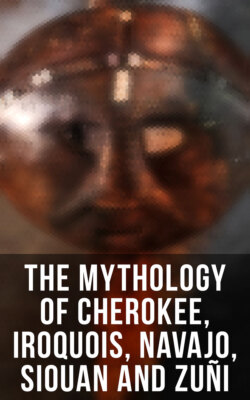Читать книгу The Mythology of Cherokee, Iroquois, Navajo, Siouan and Zuñi - James Mooney - Страница 222
На сайте Литреса книга снята с продажи.
The Drowned Child
ОглавлениеOn the banks of a river there dwelt a worthy couple with their only son, a little child whom they loved dearly. One day the boy wandered away from the lodge and fell into the water, and no one was near enough to rescue him. Great was the distress of the parents when the news reached them, and all his kindred were loud in their lamentations, for the child had been a favourite with everybody. The father especially showed signs of the deepest grief, and refused to enter his lodge till he should recover the boy. All night he lay outside on the bare ground, his cheek pillowed on his hand. Suddenly he heard a faint sound, far under the earth. He listened intently: it was the crying of his lost child! Hastily he gathered all his relatives round him, told them what he had heard, and besought them piteously to dig into the earth and bring back his son. This task they hesitated to undertake, but they willingly collected horses and goods in abundance, to be given to any one who would venture.
Two men came forward who claimed to possess supernatural powers, and to them was entrusted the work of finding the child. The grateful father gave them a pipe filled with tobacco, and promised them all his possessions if their mission should succeed. The two gifted men painted their bodies, one making himself quite black, the other yellow. Going to the neighbouring river, they plunged into its depths, and so arrived at the abode of the Water-god. This being and his wife, having no children of their own, had adopted the Indian's little son who was supposed to have been drowned, and the two men, seeing him alive and well, were pleased to think that their task was as good as accomplished.
"The father has sent for his son," they said. "He has commanded us to bring him back. We dare not return without him."
"You are too late," responded the Water-god. "Had you come before he had eaten of my food he might safely have returned with you. But he wished to eat, and he has eaten, and now, alas! he would die if he were taken out of the water."1
Sorrowfully the men rose to the surface and carried the tidings to the father.
"Alas!" they said, "he has eaten in the palace of the Water-god. He will die if we bring him home."
Nevertheless the father persisted in his desire to see the child.
"I must see him," he said, and the two men prepared for a second journey, saying: "If you get him back, the Water-god will require a white dog in payment."
The Indian promised to supply the dog. The two men painted themselves again, the one black, the other yellow. Once more they dived through the limpid water to the palace of the god.
"The father must have his child," they said. "This time we dare not return without him."
So the deity gave up the little boy, who was placed in his father's arms, dead. At the sight the grief of his kindred burst out afresh. However, they did not omit to cast a white dog into the river, nor to pay the men lavishly, as they had promised.
Later the parents lost a daughter in the same manner, but as she had eaten nothing of the food offered her under the water she was brought back alive, on payment by her relatives of a tribute to the Water-god of four white-haired dogs.
